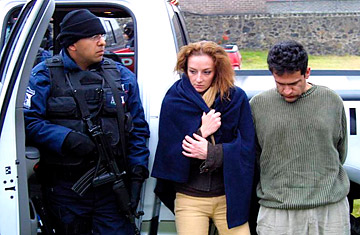
Florence Cassez of France (C) walks with Mexican boyfriend Israel Vallarta (R) after their arrest by members of Mexico's Federal Investigative Agency's (AFI) on a ranch outskirts of Mexico City in this December 5, 2009 photograph.
France and Mexico have escalated an increasingly bitter diplomatic feud over the fate of a Frenchwoman serving a 60-year sentence in a Mexican prison for kidnapping. The long-simmering row exploded this week in a flurry of swipes from both sides of the Atlantic that included a respected Mexican figure accusing French President Nicolas Sarkozy of acting "like the dictator of a banana republic" for having taking up the woman's cause.
The case centers around Florence Cassez, 36, whose final appeal of her March 4, 2009 kidnapping conviction was rejected by Mexican courts on Feb. 11. Cassez was arrested with her Mexican boyfriend Israel Vallarta on Dec. 8, 2005. A subsequent raid on Vallarta's farmhouse freed three hostages being held there — victims in what has become an epidemic of kidnapping by ransom-seeking gangs in Mexico. Though Cassez has steadfastly denied knowing about or having anything to do with the abductions, the hostages identified her as Vallarta's accomplice. Vallarta was later convicted as a leader of Los Zodíacos, a gang notorious for its activity in kidnappings plaguing the country that, according to some estimates, saw 1,870 people being snatched in 2010 alone.
However, significant irregularities in the Mexican inquiry have led observers in both countries to conclude that Cassez is innocent. Following her arrest, Cassez was held in a police truck until the next morning, when she was brought to the farmhouse and introduced as "the kidnapper" during what Mexican television said was a live broadcast of the raid freeing the hostages. Officials were later forced to admit that Cassez's presence at the dramatic bust beamed to a rapt Mexican public had been staged. Moreover, the hostages initially denied that Cassez was involved in their abduction, only to reverse themselves once the case became a cause célèbre.
Cassez's supporters also claim that the motive behind upholding her conviction is purely political: the police official in charge of her arrest, Genaro García Luna, has since become Mexico's Minister of Security, and a key player in President Felipe Calderón's battle against gangs involved in drug trafficking and kidnapping. The result is that, in the public eye, García Luna and Cassez occupy opposing iconic positions in Mexico's kidnapping scourge. Cassez's advocates claim that any admission now of her innocence would deal García Luna's crime-fighting bone fides a severe blow — and would raise questions about the manipulation of the legal system by Calderón's cabinet for political reasons.
Mexico's judicial system does have a troubling history of political manipulation and a reputation for manufacturing — rather than gathering — evidence. But Mexican authorities hotly refute the allegations over the Cassez case, and have become increasingly vocal in airing their resentment at what they say are France's efforts to interfere with a legal system that has repeatedly confirmed Cassez's guilt. But in the week since Cassez lost her final appeal on Feb. 11, that acrimony has risen to another level. On Feb. 14, French officials suggested that the yearlong series of Mexican-themed cultural events within France's "Year of Mexico" celebration be canceled to protest Cassez's treatment. The next day — echoing Cassez's explicit request from her prison cell — Sarkozy said the festivities would continue as planned, but be used to renew calls to Mexico "to solve the serious humanitarian problem of Florence Cassez." At very least, the French say, Cassez should be returned to France to serve out her sentence as stipulated by international agreements.
Good luck with that. Mexican authorities have announced they'll have nothing to do with the "Year of Mexico" events — and aren't transferring the prisoner. On Feb. 15, Mexico's Foreign Relations Ministry issued a statement protesting the idea that "a head of state would make a foreign policy decision affecting ties between two nations and governments in consultation with a person condemned by Mexican justice for a particularly serious crime." Later that day, celebrated Mexican writer Carlos Fuentes — who used to be the country's ambassador to France — said in a Mexican radio interview that "France's position in the Florence Cassez case is based on the strategy of its head of state, Nicolas Sarkozy, to restore his popularity." The populist exploitation of what has become a veritable media crusade in France, Fuentes charged, has left Sarkozy looking like "the dictator of a banana republic."
But such criticisms work both ways. Though France's extensive coverage of the Cassez case has never attempted to be objective — no commentator has ever been heard pondering whether she might actually be guilty — it's equally true that her depiction in Mexico's media as the very face of the nation's kidnapping scourge has left Mexican public opinion disinclined to consider that she could be innocent. Where France sees enormous holes and probable political meddling in the case against Cassez, Mexico says Paris is just making excuses to undermine the Mexican justice system in the hopes of freeing one of its own. One side's determination to battle a criminal plague terrorizing its population becomes the other party's motivation to further defend someone it believes is being used as handy scapegoat.
Which all explains why as the French applaud Sarkozy's pledge that "we will not leave this young woman in prison for another 60 years," Mexicans lament the comment as another insult of their justice system — and a threat of more diplomatic harassment to come.
